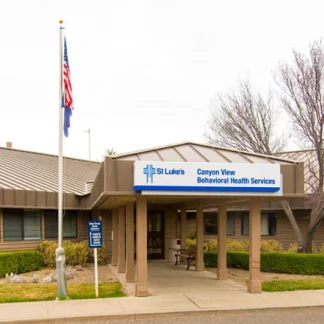A Full Life Agency
A Full Life Agency is a private rehab located in Twin Falls, Idaho. A Full Life ...
Located in Twin Falls, Idaho, St. Luke's Canyon View Behavioral Health Services is a co-occurring substance use disorder rehab for adults. Treatment methods are patient centered and evidence based; and may include psychopharmacology, individual therapy, group therapy, and milieu therapy.
Through various levels of care, St. Luke’s Canyon View offers a continuum of addiction treatment services including:
At St. Luke’s Canyon View, they offer inpatient drug rehab services. Patients admitted to this level of care receive 24 hour supervision in a safe, structured environment, focusing on intensive therapy, skill building, and stabilization. The average length of stay varies as it depends on each patient’s progress.
St. Luke’s Canyon View provides effective medication management to ensure the most beneficial outcomes. Their team collaboratively works with patients to establish the most effective medication regimen to support their treatment.
Recognizing the importance of continued support post treatment, St. Luke’s Canyon View offers aftercare services. These include ongoing therapeutic support and resources designed to help individuals sustain their recovery and prevent relapse.
Contact us for more information: (208) 814-7900

Connect with St. Luke's Canyon View Behavioral Health Services by calling their admissions team directly.
(208) 814-7900 Website Get DirectionsWhether a marriage or other committed relationship, an intimate partnership is one of the most important aspects of a person's life. Drug and alcohol addiction affects both members of a couple in deep and meaningful ways, as does rehab and recovery. Couples therapy and other couples-focused treatment programs are significant parts of exploring triggers of addiction, as well as learning how to build healthy patterns to support ongoing sobriety.
Research clearly demonstrates that recovery is far more successful and sustainable when loved ones like family members participate in rehab and substance abuse treatment. Genetic factors may be at play when it comes to drug and alcohol addiction, as well as mental health issues. Family dynamics often play a critical role in addiction triggers, and if properly educated, family members can be a strong source of support when it comes to rehabilitation.
Group therapy is any therapeutic work that happens in a group (not one-on-one). There are a number of different group therapy modalities, including support groups, experiential therapy, psycho-education, and more. Group therapy involves treatment as well as processing interaction between group members.
In individual therapy, a patient meets one-on-one with a trained psychologist or counselor. Therapy is a pivotal part of effective substance abuse treatment, as it often covers root causes of addiction, including challenges faced by the patient in their social, family, and work/school life.
Research clearly demonstrates that recovery is far more successful and sustainable when loved ones like family members participate in rehab and substance abuse treatment. Genetic factors may be at play when it comes to drug and alcohol addiction, as well as mental health issues. Family dynamics often play a critical role in addiction triggers, and if properly educated, family members can be a strong source of support when it comes to rehabilitation.
Group therapy is any therapeutic work that happens in a group (not one-on-one). There are a number of different group therapy modalities, including support groups, experiential therapy, psycho-education, and more. Group therapy involves treatment as well as processing interaction between group members.
In individual therapy, a patient meets one-on-one with a trained psychologist or counselor. Therapy is a pivotal part of effective substance abuse treatment, as it often covers root causes of addiction, including challenges faced by the patient in their social, family, and work/school life.
Group therapy is any therapeutic work that happens in a group (not one-on-one). There are a number of different group therapy modalities, including support groups, experiential therapy, psycho-education, and more. Group therapy involves treatment as well as processing interaction between group members.
In individual therapy, a patient meets one-on-one with a trained psychologist or counselor. Therapy is a pivotal part of effective substance abuse treatment, as it often covers root causes of addiction, including challenges faced by the patient in their social, family, and work/school life.
In individual therapy, a patient meets one-on-one with a trained psychologist or counselor. Therapy is a pivotal part of effective substance abuse treatment, as it often covers root causes of addiction, including challenges faced by the patient in their social, family, and work/school life.
A Full Life Agency is a private rehab located in Twin Falls, Idaho. A Full Life ...
Walker Center - Outpatient offers an array of different services for both adults...
Pro Active Advantage is a private rehab located in Twin Falls, Idaho. Pro Active...
H&H Treatment Programs - Twin Falls is a non-profit rehab located in Twin Fa...